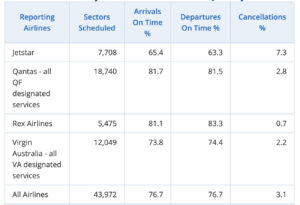ASX airline stocks flying high… but who needs a Facebook victims support group after their last flight?
News
News
How was your last flight? Did it get grounded, then delayed or even cancelled? Did the airline lose or damage your luggage? Did you fail to make it to a special occasion like a wedding or celebration with family and friends, even an important medical appointment or funeral? After working hard and looking forward to a holiday were you left disappointed from the airline experience?
If you answered yes to any of the above you’re not alone. A quick Google of “Qantas holiday” and by the time you get to “Qantas h” the autofill is suggesting “horror stories”.
Qantas (ASX:QAN), which last week reported H1 FY23 profit topping $1 billion with revenue tripling on the post-pandemic travel boom, has seen its reputation come under heavy turbulence.
And so disappointed in QAN is 83-year-old writer and commentator Phillip Adams, who gave the national carrier its ‘Spirit of Australia’ tagline, he wants it stripped from all branding.
I gave Qantas the “Spirit of Australia” slogan a few decades No longer deserved. And remember – these days much of the airline is foreign owned
— Phillip Adams (@PhillipAdams_1) January 20, 2023
There are even online victims support groups for disgruntled Qantas Group customers. Some of them are quite popular.

The Australian Government Bureau of Infrastructure and Transport Research Economics (BITRE) produces a monthly report on domestic airline on-time performance.
According to its latest January monthly report, on-time performance for all domestic routes operated by participating airlines including Jetstar, Qantas, QantasLink, Rex Airlines, Virgin Australia and Virgin Australia Regional Airlines are falling.
The on-time performance averaged 76.7% for on-time arrivals and 76.7% for on-time departures. The cancellation rate for the month was 3.1%. The equivalent figures for January 2022 were 86.5% for on time arrivals, 85% for on time departures and 11.8% for cancellations.
The report noted January’s on time arrivals figure was significantly lower than the long term average performance for all routes, which was 81.6%.
The on time departures figure was also significantly lower than the long term average or 82.8%, while the rate of cancellations was higher than the long term average of 2.1% but lower than for January 2022.

And in some further headwinds facing the Aussie airline sector, the consumer watchdog has said it will closely monitor airlines as they hold back from adding capacity to the market, contributing to some airfares skyrocketing compared to pre-pandemic prices.
In its December Airline Competition in Australia report, the Australian Competition and Consumer Commission (ACCC) found airlines continue to hold back adding capacity to the market to manage operational challenges.
“With strong demand, reduced capacity and ongoing high prices for jet fuel, airfares are higher than they have been in years, and higher than pre-pandemic levels,” the report said.
“Average revenue per passenger, an indication of average airfares across all fare types, was 27% higher in October 2022 than it was in October 2019.”
The report said the ACCC will be monitoring the domestic airlines closely to ensure they return capacity to the market in a timely manner to bring downward pressure on airfares.
“In this context, the ACCC would be concerned if the airlines withheld capacity in order to keep airfares high.”
QAN posted a $1 billion H1 FY23 profit, in a massive turnaround of its fortune from a $456 million loss for H1 FY22.
The company’s preferred underlying pre-tax profit measure rose even more to a record half year profit above $1.4 billion, as the airline’s revenue more than tripled to nearly $10 billion as domestic and international travel restrictions ended.
The airline attributed its performance to an increase in demand following restrictions in the early stages of the pandemic, which has offset higher fuel costs.
In its outlook QAN said the group had not seen any change in demand despite economic uncertainty of rising inflation and interest rates.
“Consumers continue to prioritise travel over other spend categories,” QAN said in its ASX announcement.
“Expected FY23 fuel cost is now reduced to $4.8 billion, with extensive hedging participation in 2H23.”
| Code | Company | Price | % Week | % Month | %Six Months | % Year | Market Cap |
|---|---|---|---|---|---|---|---|
| HLO | Helloworld Travl Ltd | 2.31 | 0% | 26% | 16% | 5% | $356,564,044 |
| FLT | Flight Centre Travel | 18.82 | 1% | 20% | 10% | 7% | $4,019,787,462 |
| AIA | Auckland Internation | 8.06 | 4% | 4% | 16% | 21% | $11,824,585,630 |
| AQZ | Alliance Aviation | 3.52 | 1% | 3% | -1% | 9% | $565,786,133 |
| CTD | Corp Travel Limited | 17.85 | 2% | 2% | -6% | -18% | $2,616,304,338 |
| AIZ | Air New Zealand | 0.72 | -1% | 1% | 21% | -49% | $2,425,294,307 |
| QAN | Qantas Airways | 6.535 | 2% | 1% | 26% | 29% | $11,664,216,631 |
| REX | Regional Express | 1.48 | -5% | -1% | 6% | 9% | $167,375,696 |
| WEB | Webjet Limited | 6.755 | 1% | -2% | 34% | 27% | $2,631,851,010 |
Bell Direct market analyst Grady Wulff told Stockhead airlines stocks got some much needed relief in 2022 after border closures and the grounding of flights during the early days of the pandemic.
“Demand for travel has never been higher than in recent times with borders reopening,” she said.
Wulff said investors are now looking to see if demand will go higher, plateau or come down to more normal pre-Covid levels.
“The outlook has been really important this report season.”
Wulff said the ACCC is probing why airlines are not yet be back to full capacity, their reasoning tends to be it’s due to higher fuel costs and continued Covid impacts.
“Once they are at full capacity they will need to bring the prices down, so the ACCC is looking into that on purpose at the moment,” Wulff said.
“Qantas has just released results and unsurprisingly, given how high prices have been recently and the return to full demand for travel in Australia and internationally, the Flying Kangaroo has delivered on its promise to deliver a profit in the first half of FY23.
“Capacity has returned to 72% of pre-Covid levels with domestic at 94% and international at 60% of pre-Covid levels.”
Grady said QAN investors sold out sharply at ~6% when the results were released as the company increased its capital expenditure guidance range to re-phase its existing fleet and provided no quantitive guidance for the remainder of FY23.
“Investors this reporting season have been really hawk-eyed and prioritising companies which have released controlling costs and guidance for the outlook for second half of 2023 and Qantas have failed investors on this,” she said.
Increased competition is coming into the domestic market with the arrival of Bonza Aviation Pty Ltd, known as Bonza.
Among its founders is former Virgin Blue executive Tim Jordan. Bonza calls itself “Australia’s new, and only independent, low cost airline servicing regional domestic routes”.
“The airline has five 737 Max jets operating across 17 destinations at the moment so the emergence of this new budget carrier is hoped to help ease the expensive ticket pricing pressure,” he said.
And Virgin Australia, which went into voluntary administration in 2020 and has been a serial loss-maker, is now looking at an IPO in 2023 after also returning to profitability.
“The IPO could go one of two ways – extremely well given recent woes faced by Qantas, or investors may remain wary of airlines in 2023 as demand might ease to a more normal pre-Covid level after pent up demand has taken over recently,” Wulff said.
She said higher interest rates and inflation may also have an impact on airline travel.
“They do say once an interest rate hike is announced it is not felt for two to three months later,” she said.
“We may see carriers feeling the brunt of lower demand for travel because we have less money to spend and also a lot of people have now done their travel and had massive holidays after being locked up for two years.”